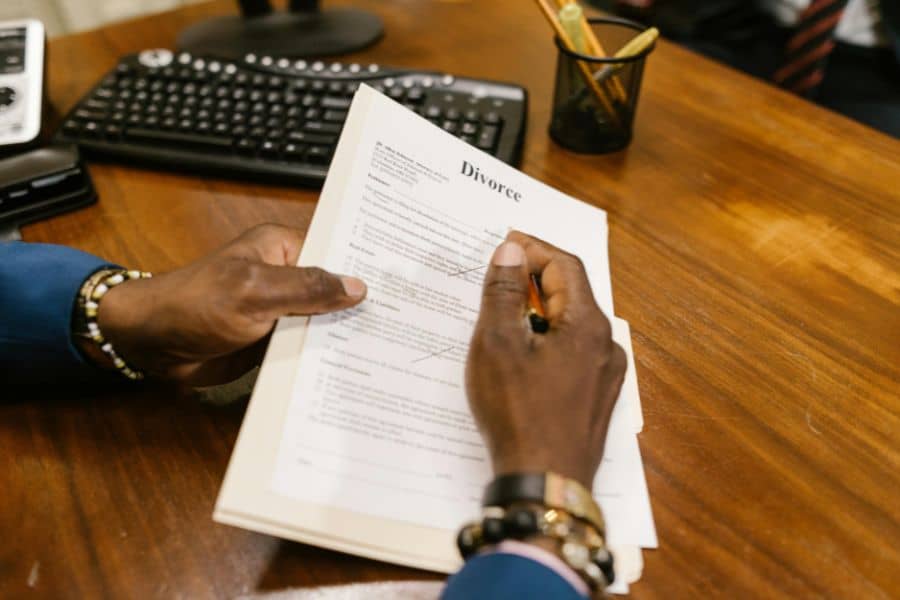If I Am Served With Divorce Papers, Do I Have to Sign Them?

When you’re served with divorce papers, it can be heartbreaking, leaving you reeling with a mix of emotions and questions. You might be wondering, “Do I really have to sign these things?”
Well, the short answer is no, you don’t have to sign the divorce papers when they’re served to you. But that doesn’t mean you can just ignore them.
What Does It Mean to Be Served with Divorce Papers?
Being served with divorce papers means your spouse has officially initiated the marriage dissolution process.
The documents you receive include a summons and a copy of the divorce petition, which outlines the grounds for divorce and any requests for property division, alimony, child custody, and child support.
Being served is a legal matter, and it’s important that you take it seriously. While you don’t have to sign the papers right away, you must respond within the specified timeframe to protect your rights in the divorce proceedings.
Do You Have to Sign the Divorce Papers When Served?
No, you don’t have to sign the divorce papers when they’re served to you. That’s a common misconception, often perpetuated by TV shows and movies. In reality, being served with divorce papers simply means that your spouse has formally filed for divorce, and you’ve been notified of the legal action.
Instead of signing the papers, you’re required to file a formal response with the court within 20 days, in Florida. This response, known as an “answer“, allows you to acknowledge receipt of the divorce papers and state your position on the matters outlined in the divorce petition, such as property division, alimony, and child custody.
It’s crucial to take this process seriously and respond within the designated time frame. Failing to do so could result in a default judgment, meaning the court may grant your spouse’s requests without considering your side of the story.
How to Respond to a Divorce Petition in Florida
After being served with divorce papers, you have several options for responding.
File an Answer
An answer is a formal response to the divorce petition in which you agree or disagree with each allegation made by your spouse. This moment is your opportunity to assert your spousal rights regarding property division, alimony, child custody, and support.
File a Counterclaim
A counterclaim, referred to as a counter-petition in Florida, is a separate petition filed by the responding spouse, which allows them to make their allegations and requests. This tool is especially helpful if you have requests that are not included in the original petition.
We highly recommend that you seek the guidance of an experienced divorce attorney when responding to a divorce petition. Our legal team will explain your rights, draft a strong response, and protect your interests.
Frequently Asked Questions
What if I disagree with the terms of the divorce?
If you disagree with any terms outlined in the divorce petition, you can contest them. You make this challenge by filing an answer or counter-petition and working with your attorney to negotiate fair settlement terms or present your case in court.
Can I refuse to sign the divorce papers?
While you can refuse to sign the papers, it does not stop the divorce process. Refusing to sign or file an answer may result in a default judgment, leading to unfavorable outcomes. It’s better to acknowledge receipt of the papers and then contest any terms you disagree with.
What happens if I don’t respond to the divorce complaint?
If you fail to respond within the allotted time (20 days in Florida), your spouse may proceed with a default judgment. This filing means the court may grant the request without your input, potentially resulting in unfavorable terms for you.
Can I file for divorce without an attorney?
While it is possible to file for divorce without an attorney, we do not recommend it, especially if you have complex issues to resolve, such as property division, alimony, or child custody. An experienced divorce lawyer can protect your marital assets and help you tackle the legal process more effectively.
You Don’t Have to Face This Alone – Vollrath Law Is Here to Help
Divorce is never easy, and being served with divorce papers can leave you feeling lost, scared, and unsure of what to do next. But here’s the thing – you don’t have to go through this alone. At Vollrath Law, we’ve helped countless people just like you get through divorce and come out the other side stronger than ever.
When you work with us, you’re not just getting a lawyer – you’re getting a partner who will listen to understand your needs and protect your interests. So, if you’ve been served with divorce papers, don’t panic. Take a deep breath, pick up the phone, and give us a call. We’ll set up a consultation and develop a strategy that works for you.
